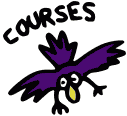To Peter Selinger's Homepage:

Winter 1999 Peter Selinger |
Course Description: One of the great discoveries of modern mathematics was that essentially every mathematical concept may be defined in terms of sets and membership. Thus set theory plays a special role as a foundation for the whole of mathematics. One of the goals of this course is to develop some understanding of how set theory plays this role. The analysis of common mathematical concepts (e.g. function, ordering, infinity) in set-theoretic terms leads to a deeper understanding of these concepts. At the same time, you will be introduced to many new concepts (e.g. transfinite ordinal and cardinal numbers, the axiom of choice) which play a major role in many branches of mathematics. The development of set theory will be largely axiomatic with the emphasis on proving the main results from the axioms.
Topics include: the intuitive concept of sets, and the paradoxes arising from it; type theory and the cumulative hierarchy of sets; the Zermelo-Fraenkel axioms for sets theory; set-theoretic representations of the fundamental concepts of mathematics (such as functions, numbers), and of the basic proof principles for these concepts (e.g. mathematical induction); infinite cardinal and ordinal numbers and their arithmetic; transfinite induction; the axioms of choice and its equivalent formulations (e.g. Zorn's Lemma). If time permits, we may discuss some advanced topics, such as Gödel's incompleteness theorems or the independence of the continuum hypothesis from the axioms of set theory.
Prerequisites: The official prerequisite, "Math 412 or 451 or equivalent experience with abstract mathematics," means that students should be comfortable with writing mathematical proofs. No specific knowledge of set theory will be presupposed.
Course Work: We will have two in-class (1 hour) midterms,
probably on
Grading: Grades will be based on exam performance. Each midterm counts 30% and the final 50%. Out of these 110%, the lowest 10% will be dropped. In borderline cases, homework will be the tie-breaker.
Textbook: Herbert B. Enderton. Elements of Set Theory. Academic Press.
Office Hours: Mon 3-4 in the Math Lab (B860 EH), Wed 3-4 in my office (3847 EH). Phone: 763-0292. Email: selinger@mathstat.dal.ca.
Course Homepage: Updated information, homework sets, any
handouts, etc., will be available from
http://www.mathstat.dal.ca/~selinger/courses/582W99/
To Peter Selinger's Homepage:
![]()